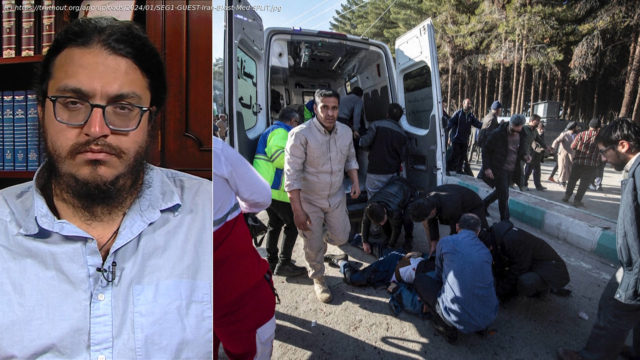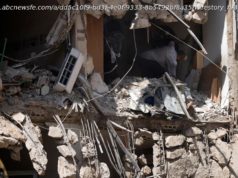No one has yet claimed responsibility for the attack, which killed dozens and injured hundreds more.
Twin explosions in the Iranian province of Kerman killed dozens and injured hundreds Wednesday at a memorial for top Revolutionary Guards general Qassem Soleimani, who was assassinated in a U.S. drone strike four years ago in Iraq. No one has yet claimed responsibility for the attack, but Iran has placed blame on Israel and the U.S, while U.S. officials and regional experts have suggested ISIS as the culprit. Our guest, Iranian historian Arash Azizi, discusses the potential sources of the attack, the scale of the tragedy — which occurred on Mother’s Day in Iran and may count among its victims civilians visiting their mothers’ graves — and fears of wider war in the midst of Israel’s ongoing violence in Gaza. Azizi, who has authored a book on Soleimani’s assassination, calls the double blast “one of the deadliest — if not the deadliest — attacks of its kind in recent history.”
NERMEEN SHAIKH: Iran is observing a national day of mourning as the death toll from twin explosions Wednesday has reached 84, with many others injured. The blasts in south-central Kerman province killed attendees to a memorial for top Revolutionary Guards General Qassem Soleimani, who was assassinated in a U.S. drone strike four years ago in Iraq. This is a survivor who was being treated in a nearby hospital.
NERMEEN SHAIKH: No one has claimed responsibility for the attack, but Iran has placed blame on Israel and the U.S. The White House said the Islamic State could be behind the bloody bombings, and rejected claims Israel or the U.S. was involved.
The tragedy comes amid mounting fears that Israel’s war on Gaza could lead to a wider regional conflict. One day before the blasts, a senior Hamas leader and Iran ally, Saleh al-Arouri, was killed in a strike in southern Beirut, which Lebanese officials blamed on Israel. And earlier today, a drone strike killed four members of an Iranian-backed Iraqi militia in Baghdad. Iraqi authorities have blamed the U.S.-led international coalition for the attack.
AMY GOODMAN: For more, we’re joined by Arash Azizi, Iranian historian and writer. His book is titled The Shadow Commander: Soleimani, the U.S., and Iran’s Global Ambitions. His recent piece in The National is headlined “Who are the likely suspects in the Kerman blasts, and what does this mean for Iran?” His forthcoming book, out next, is titled What Iranians Want: Women, Life, Freedom.
Thanks so much for joining as, Arash Azizi. Can you start off by talking about the significance of these two attacks in Iran? No one has yet claimed responsibility, but what you think this looks like?
ARASH AZIZI: These are really terrible attacks if you look at the death toll, although the death toll is actually being readjusted, with lower now. Now it’s between eighties and nineties, but it still makes it one of the deadliest — if not the deadliest — attack of its kind in recent history, perhaps even in sort of modern Iranian history. So they’re truly terrible.
And, of course, they do come at a time when the region is very tense. There’s been a shadow war between Iran and Israel and the United States for many years now, but especially in the last few months. And the anniversary of Soleimani’s killing four years ago is already a very tense day, because, you know, it involves a lot of groups in Iraq, in Lebanon, in Iran and Israel, Syria. A lot of them are linked to Soleimani in one way or the other. So it’s a very tense time, and the attack comes at that time.
Now, it is true that we don’t really know who did the attack yet. No one has really claimed it yet. A lot of experts that I’ve spoken to, and myself looking at the existing evidence, believe that it’s sort of — the likely culprit, in my opinion, is to be the Islamic State, particularly its group, its regional group, based in Afghanistan, known as ISIS-Khorasan, in Khorasan province. And this is a group that because of the kind of attacks that it did, kind of a mass civilian killing, because of the — you know, putting the bombs in briefcases, and some of the more — you know, some of the more specific methods used and the targets that they’ve picked, this makes them to be the most likely culprit that have committed the attacks.
NERMEEN SHAIKH: So, Arash, can you explain — I mean, you’ve written this book on Qassem Soleimani — the significance of this attack taking place on the day, the fourth anniversary of his death, as people were gathering in his burial place, where his body is? But why would the Islamic State, as you said, Islamic State-Khorasan — why would they — what would be the incentive for them to carry out an attack now in the midst, as you say, of the — what’s going on in Gaza, just — the attack now in Kerman taking place just a day after al-Arouri was assassinated in Beirut? Why Islamic State?
ARASH AZIZI: You know, it’s likely that they might have planned this attack long ago.






